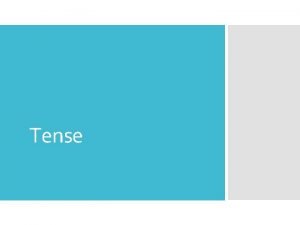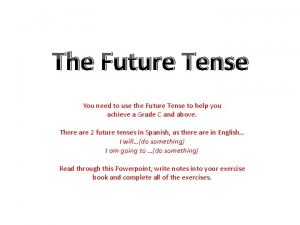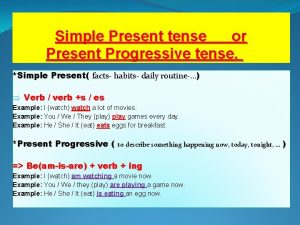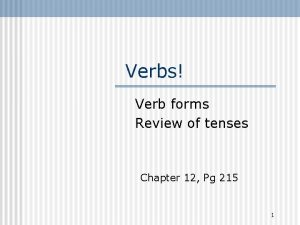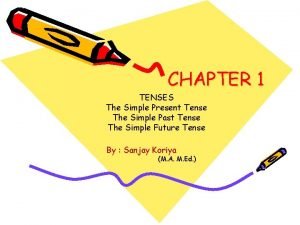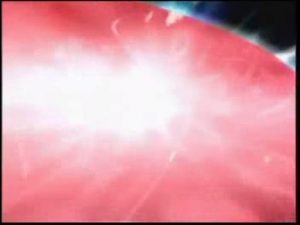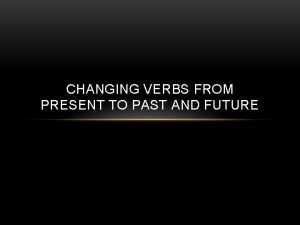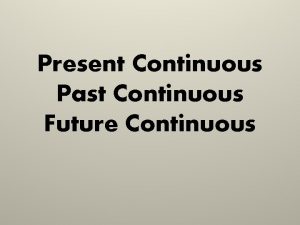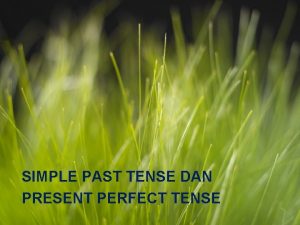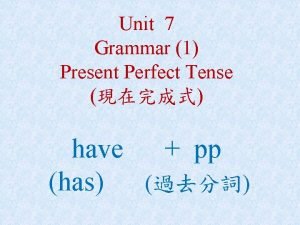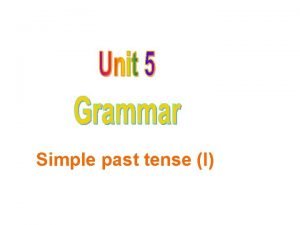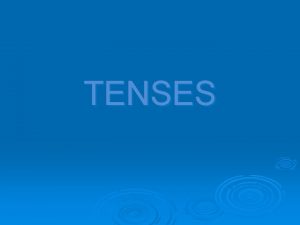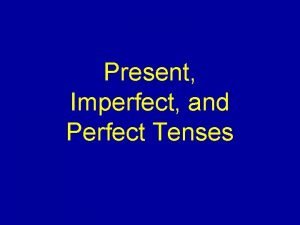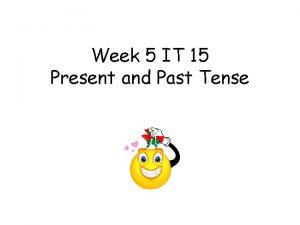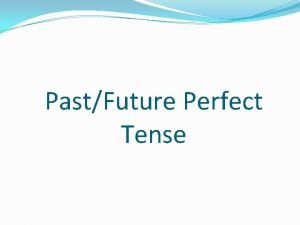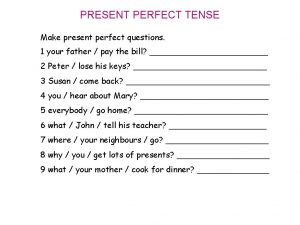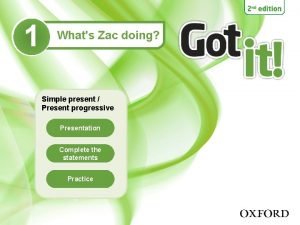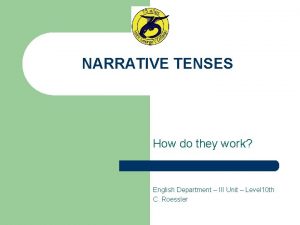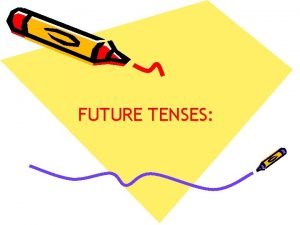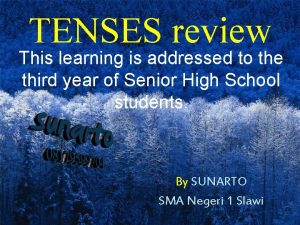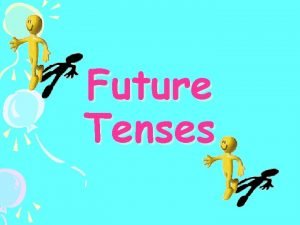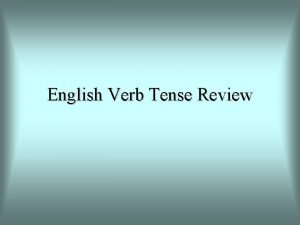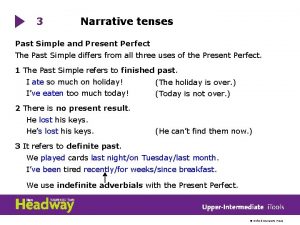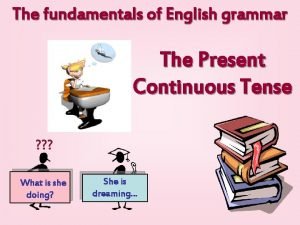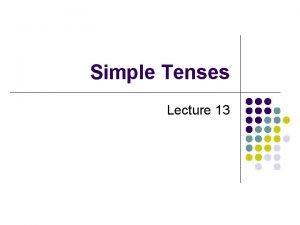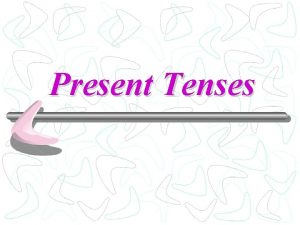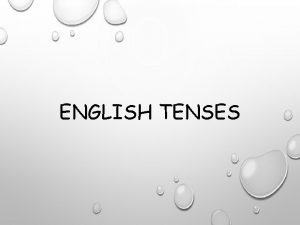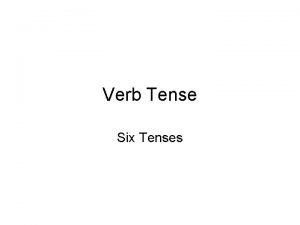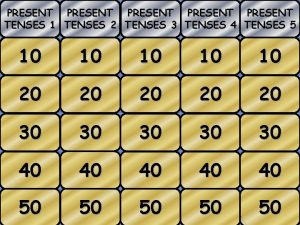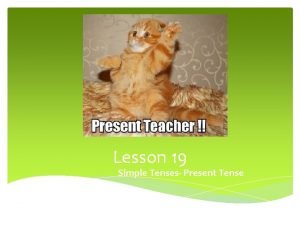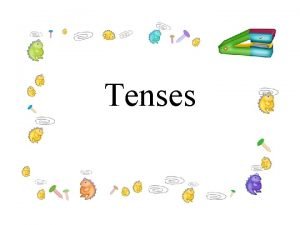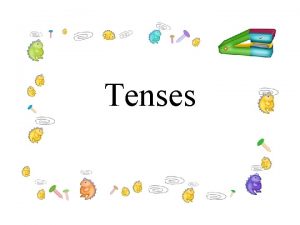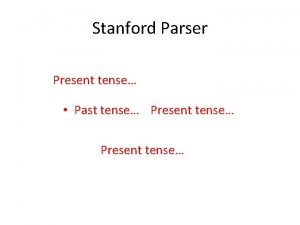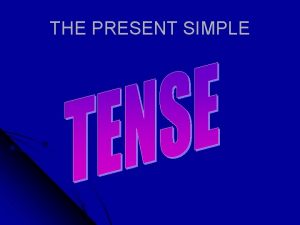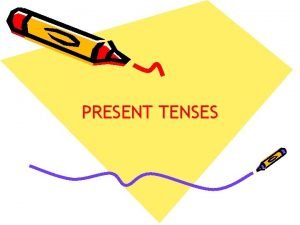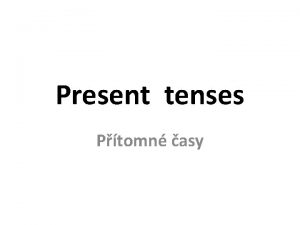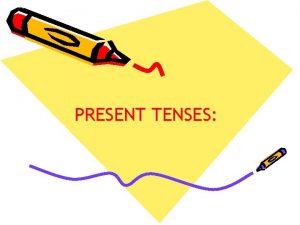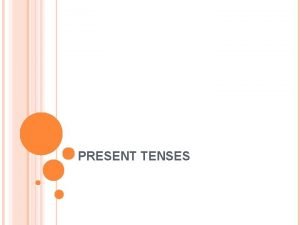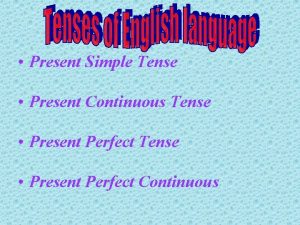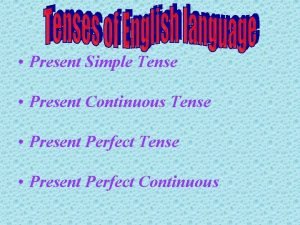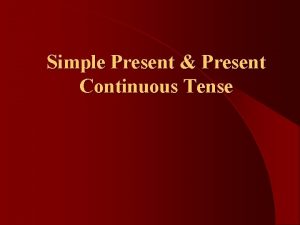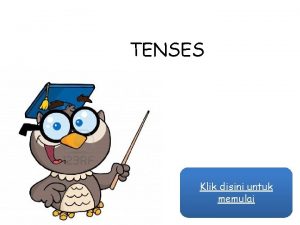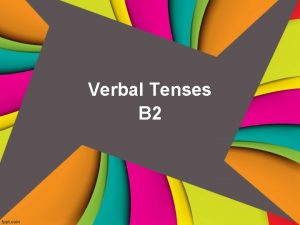ENGLISH TENSES PRESENT TENSES TENSE HOW IT IS


































- Slides: 34


ENGLISH TENSES PRESENT TENSES

TENSE HOW IT IS FORMED USING TIME EXPRESSIONS EXAMPLES Present Simpleнастоящее простое 10 V; Vs 10 1. пост. ситуац 2. регул. дейс. 3. законы прир 4. расписание 5. повествов. 10 every…, usually often, always, rarely, never, sometimes, in the morning , on Mondays 10 I usually get up at 7 o`clock. 10 20 20 20 Present Be going Perfect to Настоящее Continuous совершенное 30 HAVE/ HAS +V 3 30 40 Have/Has Be going been to +Ving 40 недавно совершен действие нач. в действие прошлом и неизвестно когда продол. до наст. произошло Прош. действие личные определен. длит изменения имеющее резул. ударен. на цифры 30 Ever, never, just, yet, already, always, how long, so far, recently, since, for, today, this week/month 30 50 40 How long, for, since 40 50 Запланирован. действия или намерения, свидетельство, что то скоро произойдет 50 tomorrow, tonight, next week, in two days, the day after tomorrow, soon, in a week 50 She is going I have been I have working here to visit her done my for 10 years parents h/w tomorrow 30 40 50

НАСТОЯЩЕЕ ПРОСТОЕ A. Present Continuous B. Present Simple C. Past Simple back




НАСТОЯЩЕЕ ПРОСТОЕ PRESENT SIMPLE EXAMPLES She works as a teacher. Water freezes at 0 C. The plane leaves at 6. 05. She acts brilliantly in this film. V 1; Vs (Глагол в 1 форме; глагол с окончанием “s” в 3 лице ед. числа) back TRAINNING

V 1; Vs (Глагол в 1 форме; глагол с окончанием “s” в 3 лице ед. числа) Present Simple/Present Continuous 1. Water boils / is boiling at 100 degrees celsius. (boil) 2. The moon goes / is going round the earth (go) 3. I usually go / is going to work by car. 4. I hear / am hearing you've got a new job. 1. 2. 3. 4. 5. 6. 7. My sister (to get) up at eight o'clock. She (to be) a school girl. She (to go) to school in the afternoon. Jane (to be) fond of sports. She (to do) her morning exercises every day For breakfast she (to eat) two eggs, a sandwich and a cup of tea After breakfast she (to go) to school. She (to speak) French well. It (to take) him two hours to do his homework back TRAINNING


НАСТОЯЩЕЕ ПРОДОЛЖЕННОЕ A. Present Simple B. Present Continuous C. Present Perfect back




Examples I am living in the hotel in London now. She is looking for a better job. She is always interrupting me! We are visiting our grandma today. His English is getting better. back TRAINNING

Present Simple/Present Continuous Ве + Ving (be +глагол с окончанием “ing” ) 1. The water boils / is boiling. Can you turn it off? 2. Look! That man tries/ is trying to open the door of your car. 3. Can you hear those people? What are/is they talking / talk about? 4. I must go now. It gets / is getting late. 5. 'Hurry up! It's time to leave. ' 'OK, I come / am coming. ' 1. Let's go out. It (not/rain) now. 2. Hurry up! Everybody (wait) for you. 3. Don't put the dictionary away. I _______ it. (use) 4. Who is that man? Why_____ at us? (he/look) 5. I (think)of selling my car. Would you be interested in buying it? back TRAINNING

Ве + Ving (be +глагол с окончанием “ing” ) Упражнения 3. Раскройте скобки, употребляя глаголы в Present Continuous. (NOW) 1. The boys (to run) about in the garden. 2 I (to do) my homework. 3. John and his friends (to go) to the library. 4. Ann (to sit) at her desk. She (to study) geography. 5. A young man (to stand) at the window. He (to smoke) a cigarette. 6. The old man (to walk) about the room. 7. The dog (to lie) on the floor. 8. You (to have) a break? 9. What language you (to study)? 10. Who (to lie) on the sofa? 11. What they (to talk) about? 12. It still (to rain). 1. The boys are running about in the garden. 2 I am doing my homework. 3. John and his friends are going to the library. 4. Ann is sitting at her desk. She is studying geography. 5. A young man is standing at the window. He is smoking a cigarette. 6. The old man is walking about the room. 7. The dog is lying on the floor. 8. Are you having a break? 9. What language are you studying? 10. Who is lying on the sofa? 11. What are they talking about? 12. It is still raining. back

Настоящее совершенное A. Present Simple B. Present Continuous C. Present Perfect back




Examples back 1. Do you know about Sue? She's given up her job. right wrong 2. The Chinese have invented printing. right wrong 3. How many plays has Shakespeare written? wrong right 4. Have you read any of Shakespeare's plays? right wrong 5. Aristotle has been a Greek philosopher. right wrong 6. Wow! I've cut my finger. It's bleeding. right wrong 7. My grandparents have got married in London. wrong right 8. Where have you been born? wrong right 9. Mary isn't at home. She's gone shopping. right wrong 10. I've lost my key. I can't find it anywhere wrong right TRAINNING

1. What are you (to talk) about? 2. We have just (to talk) about it. 3. He has just (to say) something about it. 4. She is (to tell) them some interesting story. 5. He has (to tell) us nothing about it. 6. She has (to tell) them some stories about dogs. 7. We have (to have) two lessons today. 8. They are (to have) a meeting. 9. She has not (to speak) yet. 10. They have (to ask) me several questions. 11. He has already (to learn) the rule. 12. I am (to write) an exercise. 13. What is he (to do)? , — He is (to read) a newspaper. 14. Have you (to | read) any stories by Jack London? 15. What are you (to do) here? — I am (to write) a letter to my friends. 1. What are you talking about? 2. We have just talked about it. 3. He has just said some thing about it. 4. She is telling them some interesting story. 5. He has told us nothing about it. 6. She has told them some stories about dogs. 7. We have had two lessons today. 8. They are having a meeting. 9. She has not spoken yet. 10. They have asked me several questions. 11. He has already learnt the rule. 12. I am writing an exercise. 13. What is he doing? — He is reading a newspaper. 14. Have you read any stories by Jack London? 15. What are you doing here? — I am writing a letter to my friends. back

Настоящее совершенное продолженное A. Present Simple Continuous B. Present Perfect Continuous back

HOW IS Present Perfect Continuous FORMED A. HAVE/HAS +V 3 B. Have been +Ving C. Ве + Ving back



Examples (have/has been +Ving) Поставьте глагол в правильную форму и переведите на английский некоторые слова в предложениях: 1. We (think) of it for two hours, but cannot найти решение. 2. Why are you so sleepy and tired? I (work) всю ночь. 3. We (to live) in Spain for 2 months, but we даже не думаем уезжать. 4. У меня раскалывается голова, cos I (drive) for 5 hours. 5. Who наговорил ей (talk to her), чем я занимаюсь? 6. Your Mum молодо выглядит. Yes, she (go in for sport) many years. 7. How long вы стоите в очереди? Почти два часа. 8. I (live) here for 23 years и хорошо разбираюсь в истории 1. We have been thinking of it for two hours, but (still)cannot find a solution. 2. Why are you so sleepy and tired? I have been working the whole night. 3. We have been living in Spain for 2 months, but we even don’t think to leave. 4. I have a splitting headache, cos I have been driving for 5 hours. 5. Who has been talking to her that I do? 6. Your Mum looks young. Yes, she has been going in for sport many years. 7. How long have you been waiting for your turn? Almost 2 hours. 8. I have lived (I have been living) here for 23 years and I am good at the history of the city! back TRAINNING

Be +Ving / have /has been +Ving Поставьте глаголы в правильную форму и время, present continuous или present perfect continuous. Maria …………………. . (learn) English for two years. Hello, Tom. I …………. . (look) for you all morning. Where have you been? ? ? Why …………. (you/look) at me like that? ? ? Stop it! We always go to Ireland for our holidays. We …………………. (go) there for years. I ……………. (think) about what you said and I’ve decided to take your advice. ‘Is Ann on holiday this week? ? ? ’ ‘no, she …………… (work). ’ Sarah is very tired. She …………. . (work) very hard recently. I can’t open the door. It seems to me I (to loose) my key. I wonder if anything (to happen) to Chris. I (to laugh) to tears over this clip This woman (to live) next door for quite a long time. Why you (not to bring) me the letters for signature? You (to paint) for a whole day? back

Собираться сделать ч-л A. Be going to B. Have to C. Can do back



Examples Example: I _____ (buy) some milk this afternoon. Answer: I am going to buy some milk this afternoon. 1. The girls (give) Simon a book for his birthday. 2. Peter (learn) his English vocabulary. 3. Jayne (throw) the ball to Mary. 4. We (swim) across the Channel next year. 5. Mary (phone) her mum, because she's late. 6. Jonathan (hit) his sister. 7. I (make) lunch early today. 8. We (do) our homework later. 9. They (take) the dogs out for a walk. 10. Mr Pearson (stay) at home tomorrow. back TRAINNING

Helen. . . . (change) her hairstyle. is going to changing is going to change Fred and Paul. . . . (not visit) their grandma. aren’t going to visit isn’t going to visit. . . . you. . . (cheat) during your exams? Are, going to cheat Are, cheating His father. . . . (not help) him with the cooking. ’s not go to help is not going to help. . Clara’s little sister. . . (eat) a biscuit? ’s, going to eat Is, going to eating My best friends. . . . (not go) to the cinema tomorrow. not going isn’t going to go Matthew’s parents. . . . (buy) a new car. are going to buy ’re buying. . Evelyn. . . . (fly) to Greece this week? Is, flying Are, going to fly They. . . . (not come) back home before midnight. ’ren’t going to come isn’t going to come I. . . . (watch) TV tonight. ’m going to watching back
 Tenses chart
Tenses chart Future tense of bring
Future tense of bring Present simple
Present simple Simple present tense vs present continuous tense exercise
Simple present tense vs present continuous tense exercise Present perfect tense vs present perfect continuous tense
Present perfect tense vs present perfect continuous tense Complete the spaces with the present continuous tense
Complete the spaces with the present continuous tense Present perfect tense vs present perfect continuous tense
Present perfect tense vs present perfect continuous tense Verb tense review
Verb tense review 5 simple present tense
5 simple present tense Present tenses in english
Present tenses in english Past progresive
Past progresive Verbs from present to past
Verbs from present to past Present continuous tense and past continuous tense
Present continuous tense and past continuous tense Past tense dan present tense
Past tense dan present tense Has have grammar
Has have grammar Drive simple present tense
Drive simple present tense Present tense to past tense
Present tense to past tense I study english everyday simple present tense
I study english everyday simple present tense Present imperfect tense
Present imperfect tense Present perfect tense english
Present perfect tense english Present continuous tense urdu to english translation
Present continuous tense urdu to english translation Perfect tense
Perfect tense Make present perfect questions.
Make present perfect questions. Simple present present progressive
Simple present present progressive Present simple lesson
Present simple lesson Present simple affirmative
Present simple affirmative English narrative tenses
English narrative tenses V present
V present There are four future verb tenses in english
There are four future verb tenses in english English tenses review
English tenses review Future tenses english
Future tenses english Tense indicators
Tense indicators Narrative tenses
Narrative tenses What simple tenses are the fundamentals of english grammar
What simple tenses are the fundamentals of english grammar Lecture on tenses
Lecture on tenses
